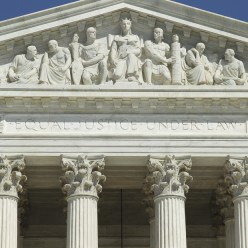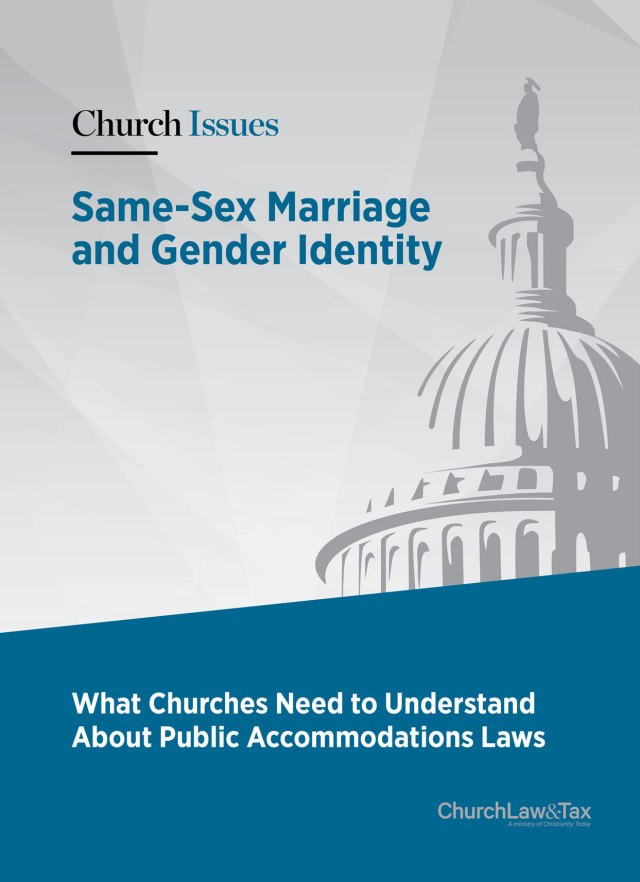Editor’s Note: In April, the Supreme Court of the United States heard oral arguments in Obergefell v. Hodges , a case that likely will decide whether same-sex marriage is legal nationwide. Deliberations are underway, with a decision expected sometime in June. Ahead of that ruling, we posed six questions about the case and what leaders should know to Richard Hammar, senior editor of Church Law & Tax Report and ChurchLawAndTax.com .
To date, 36 states and the District of Columbia have recognized the legal rights of same-sex couples to marry. If the Supreme Court does the same in June, as many expect it will, what will change?
Should the Supreme Court decide there is a constitutionally protected right for same-sex couples to marry, it will affirm the laws and court decisions of states that already recognize such a right and it will overturn the laws of the remaining states that define marriage as a union between a man and woman only.
You have followed this issue closely for several years now. What have you learned?
Most state laws and court rulings sanctioning same-sex marriage contain a very specific religious exemption for clergy. The exemptions say any clergy who oppose same-sex marriage based on their sincerely held religious beliefs may choose not to officiate same-sex wedding ceremonies.
Do you expect the Supreme Court to include a similar exemption with its ruling next month, should it recognize a constitutional right for same-sex couples to marry?
Yes. And others do, too. Douglas Laycock, one of the country’s premier constitutional scholars, supports same-sex marriage rights, but in a brief submitted to the Supreme Court advocating the rights of same-sex couples to marry, he also implored the Court to provide a definitive clergy exemption.
Beyond clergy, what will the Supreme Court ruling mean for churches that oppose same-sex marriage? Will they be required to host same-sex wedding ceremonies?
That’s not a question currently before the Court. The case before it only addresses the legal right of same-sex couples to marry.
Such uncertainty has made some church leaders who oppose same-sex marriage nervous. Should churches that allow their buildings to be used by outside individuals for weddings reconsider that practice?
This is, no doubt, a difficult matter for churches to decide, especially among those that wish to provide their buildings as a service to their local communities in exchange for minimal fees to cover costs associated with the use of the buildings. I addressed the question in the January/February 2015 issue of Church Law & Tax Report. The answer is complicated by two factors, which I’ll quote here:
First, the courts have yet to address the issue, and so all we can do is speculate. Second, any answer will depend on the wording, application, and exemptions of a veritable patchwork quilt of thousands of local, state, and federal laws forbidding discrimination by places of “public accommodation.” This makes it impossible to generalize. A church must determine (1) if it is a place of “public accommodation” under applicable local, state, or federal laws; (2) if so, are exemptions available; and (3) the constitutional protections available to churches based on applicable judicial precedent. The answers to these questions will vary from jurisdiction to jurisdiction. I suspect that the courts ultimately will conclude that the greatest constitutional protection would apply to churches that allow their premises to be used for weddings only among members. But any constitutional protection likely will be diminished or eliminated for churches that rent their facilities to the general public as a revenue-raising activity. Church leaders should carefully consider the potential downside of entering the commercial marketplace in order to raise needed funds.
The Washington Post recently reported on concerns regarding the tax-exempt status of churches, church-run schools, and religiously affiliated colleges and universities that oppose same-sex marriages. This was based on a specific exchange from the oral arguments before the Supreme Court in April, and it has further raised concerns among many church leaders. We’re often asked whether churches should amend their church bylaws—as a measure of protection—to state they hold a traditional, orthodox view of marriage as a union between a man and a woman only. Would a change like this help a church?
Let me make a couple of comments in response to this question.
First, there certainly is no downside to including such a provision in a church’s governing documents, but I would point out that many of the church governing documents I have reviewed already contain a strong doctrinal statement that may make such an additional provision redundant.
Second, such a statement in a church’s bylaws may not accomplish the desired protection. In 1983, the Supreme Court ruled that the IRS had properly revoked the tax-exempt status of Bob Jones University on the basis of its racially discriminatory practices. The Court reasoned that the fundamental public policy of eradicating racial discrimination in higher education precluded the university from enjoying the privilege of tax-exempt status, even though the university based its racially discriminatory practices on what it considered to be biblical grounds. The Court noted that “certain governmental interests are so compelling as to allow even regulations prohibiting religiously based conduct.”
This ruling suggests that doctrinal provisions in the governing documents of religious schools may not be enough to fend off IRS challenges to tax-exempt status if the IRS or the courts conclude that the right of same-sex couples to marry is a fundamental and compelling public policy. During the oral arguments last month before the Supreme Court, Justice Alito asked the Solicitor General (who was arguing that same-sex couples have a constitutional right to marry) if the Bob Jones University ruling would result in the loss of tax-exempt status of any religious school that opposed same-sex marriage. The Solicitor General responded, “it’s certainly going to be an issue.”
The same logic could apply to churches themselves if the Supreme Court rules that same-sex marriage is a fundamental right enshrined in the Constitution. In one chapter of a book published last year by Cambridge University Press, a law school professor suggested that churches that engage in any discriminatory practices involving sex, sexual identity, or sexual orientation should be denied tax-exempt status. This would include the Roman Catholic Church, based on its refusal to ordain female priests, and any church that discriminates against persons based on sexual orientation or sexual identity. Like Bob Jones University, they would be free to continue their discriminatory practice, but at the cost of losing their tax-exempt status.
It is doubtful that such a result could be avoided by a provision in a church’s bylaws defining marriage as a union between a man and woman. Remember that the Supreme Court upheld the revocation of the tax-exempt status of Bob Jones University based on its racially discriminatory policies even though those policies were based on the university’s religious beliefs.
The bottom line is that including a statement in a church’s bylaws defining marriage may be of some help should the church’s tax exemptions be challenged, or if the church is sued for violating a public accommodations law due to its refusal to host same-sex marriages, but it is no guaranty of protection.
Watch for updates on the Supreme Court’s ruling on ChurchLawAndTax.com, and upcoming issues of Church Law & Tax Report. Our sister publications are also following the upcoming ruling. Christianity Today, the nonprofit media ministry that publishes ChurchLawAndTax.com and Church Law & Tax Report, provides more information about its position on same-sex marriage on this Christianity Today magazine topic page.

